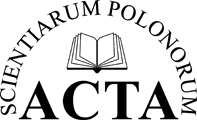DIURNAL VARIATIONS OF THE BASIC PHYSICO-CHEMICAL CHARACTERISTICS OF A SMALL URBAN RIVER – THE SOKOŁÓWKA IN ŁÓDŹ – A CASE STUDY
1
Faculty of Geographical Sciences, University of Lodz
Publication date: 2019-04-30
Corresponding author
Adam Bartnik
Department of Hydrology and Water Management, Faculty of Geographical Sciences, University of Lodz, ul. Narutowicza 88, 90-139 Łódź
Department of Hydrology and Water Management, Faculty of Geographical Sciences, University of Lodz, ul. Narutowicza 88, 90-139 Łódź
Acta Sci. Pol. Formatio Circumiectus 2018;17(3):23-38
KEYWORDS
water qualityphysico-chemical characteristics of watersdiurnal variationsanthropogenic pressureurban hydrologyPoland
ABSTRACT
The main purpose of the paper was to identify diurnal variations of the selected physico-chemical water characteristics (discharge, specific electrical conductance, temperature, pH and dissolved oxygen) of a small urban river that had been heavily transformed by human activity (Sokołówka river catchment with the area of 7.71 km2). The data came from measurements conducted in the period between 4 October 2011 and 3 October
2012, using the YSI 6920 V2 (multi-parameter sensor) and ISCO 2150 (automatic current meter), in 15- and 10-minute intervals, respectively. The research has proven the existence of rhythms of diurnal and seasonal variability to the selected water characteristics. The variability of the hourly values of the tested characteristics in particular days depends to a large extent on the value of the analysed parameter itself. The variability coefficients of discharge and conductivity increase with the increase in the values thereof. For dissolved oxygen, pH, and water temperature, the variability coefficients decrease with the increase in the values thereof. In the case of water pH, its specific electrical conductance, and temperature, the correlations between the given parameter and its variability observed at different times of day are not linear, but they run along loops of varying curvature. The average diurnal variability of SEC and pH parameters in the Sokołówka river was significantly changed as a result of human impact. The maximum readings of the conductivity and the pH shifted to the morning hours, with no change to the minimum readings.
Share
RELATED ARTICLE
We process personal data collected when visiting the website. The function of obtaining information about users and their behavior is carried out by voluntarily entered information in forms and saving cookies in end devices. Data, including cookies, are used to provide services, improve the user experience and to analyze the traffic in accordance with the Privacy policy. Data are also collected and processed by Google Analytics tool (more).
You can change cookies settings in your browser. Restricted use of cookies in the browser configuration may affect some functionalities of the website.
You can change cookies settings in your browser. Restricted use of cookies in the browser configuration may affect some functionalities of the website.


